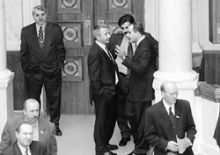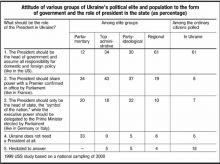Ukraine can overcome its crisis only after its top echelons learn to sacrifice corporate interests for national goals.
Every step forward humanity has taken was conceived and initiated inside a small elite group. To confirm this, suffice it to analyze any period in the history in the development of science, art, literature, and politics. In other words, any kind of societal movement is determined by that society’s elite. What kind of elite does today’s Ukraine have?
WHY ARE ASTROLOGERS TRUSTED MORE THAN THE AUTHORITIES?
Leafing through newspapers and magazines, you can often come across lamentations that we do not seem to have a true national elite. But in reality, such statements are incorrect, to say the least. There can be no society without an elite. Otherwise, it would be a herd, not a society (on the other hand, even a herd has its leaders whose behavior governs that of others). The elite is inevitably formed in any society or state, irrespective of its development level or administrative system: there are people always and everywhere, who choose the way for the whole society to go.
Then the dispute about whether or not we have an elite is absolutely pointless: the place of the elite is never vacant. It would be more correct to discuss other questions: how is the elite fulfilling its functions? To what extent does it meet society’s needs? In other words, what comes to the fore is the problem of the national elite’s quality.
The current Ukrainian political elite can hardly be considered one of high quality and satisfying the people’s desires. This is clearly evidenced by sociological data. The results of a poll conducted by the Institute of Sociology of the Ukrainian National Academy of Sciences reveal the following eloquent fact: even astrologers are trusted in this country more than the legislative and executive bodies. This kind of popular mistrust is more than alarming. For historical experience shows that only a close- knit elite can save a state from collapse in a crisis and lead it to prosperity. This means that, unless Ukraine forms the cream of its society, which the people will recognize as their elite, it will never achieve prosperity.
What stands in the way of creating precisely this kind of elite which would meet the people’s needs? To answer this question, let us first analyze the condition of our current elite, and, secondly, say firmly what the people want.
To start with, let us specify what we essentially mean by elite. It is important to stress that it consists not only of the governing statesmen and political leaders. This notion also includes influential business people, leaders of industrial facilities and non-governmental organizations, ideologists, intellectuals in various spheres of social activity, influential journalists, and opposition leaders, the so-called counter-elite. In other words, all those who influence the making of society’s rules of the game.
Proceeding from the extent to which the elites are coherent and close-knit, they can be arbitrarily divided into two types: united and disunited. The former type is characterized by a high degree of coherence, coordinated actions, and similar views about the crucial problems of society. The individuals and groups making part of this type of elite are closely connected one way or another with one another. An elite like this is quite a monolithic and, hence, assertive force.
Elites of the latter type are, on the contrary, characterized by disunity, and an inner propensity to conflict, and the absence of mutual ties, clear-cut agreements, and a basis for unity. In fact, all segments of such an elite are in a state of permanent war with each other. Its main goal is to pursue its own corporate interests, even to the detriment of the whole society. This type of elite dominates under unstable political regimes, which continuously waver between authoritarian and democratic forms of societal governance. This type is typical of the transition countries, of which Ukraine is one.
A split of the elite into hostile segments automatically makes it impossible to carry out reforms, and promotes a rise in crime and endless political wars. It is a rhetorical question whether a body can function normally if its parts are warring with one another.
Let us refer again to historical experience. It clearly shows that the main component of the success of all elites, which managed to overcome a crisis in society was their ability to unite for the sake of common good and subordinate their corporate interests to the long- term national priorities. The conclusion is obvious. Unless our political elite transforms from the latter to the former type, there can be no question of this country overcoming its crisis. And only in this case will the people rape their elite. In any case, it is best to ask the people themselves what they want; this is the purpose of sociological research. Then let us look at the interesting results of such research.
WHY DO THE PEOPLE NEED A STRONG HAND?
Table 1 shows the data of a poll conducted by Ukrainian Sociology Service (USS).
The results reveal that so- called ordinary citizens clearly display a desire to have one master in the house, who must bear all responsibility for the domestic and foreign policies. However, this kind of authoritarian attitude is not new for Ukrainian citizens. It has deep historical and mentality- related roots. A long time ago, the great Ukrainian sociologist Vyacheslav Lypynsky, analyzing the causes of the failure of the Ukrainian national liberation movement in the UNR period, stressed that it was the absence of a nationally recognized leader and the national elite that were the main causes of defeat.
Subsequent events could only enhance the social tendency mentioned. The transition from communist totalitarianism to democracy was accompanied, sad as it is, by the massive discrediting of democratic ideals in the eyes of society. This happened for many reasons, and above all because the authors of perestroika were in essence either products of the system they tried to break down or national romantics (former dissidents) capable of screaming nice slogans at rallies but absolutely incapable of putting such slogans into practice. Attractive promises of building a civil society where the law reigns supreme, privatization process transparent, and hopes for the introduction of civil control over the authorities, remained hollow in reality. Thus, can it be surprising that as soon as in the early nineties the population of Ukraine began to show sentiments favoring a tough authoritarian power? Sociologist Yevhen Holovakha characterizes the mass sentiments of that time: “Judging by opinion divisions, only a presidential-parliamentary republic can be an alternative to a presidential republic, and other forms of government lack significant support of the population... and most of the population share the idea that the institution of presidency should be kept intact in Ukraine. A more uncertain situation surrounds the scope of presidential powers. In any case, it is obvious that the idea of the president’s symbolic role enjoys the least support. Most supported is the idea of vesting the president with all executive power.”
This means today’s popular longing for a strong hand is in no way a momentary sensation but the reflection of an old deeply rooted social attitude. Frankly, this is not only a sociopolitical but also a psychological phenomenon. And if we analyze what is now happening on the Olympus of power, we will easily conclude that this social tendency is increasing with every passing day. The fruitless war of Deputies in Parliament, domination of political demagogy over lawmaking, and chronic splits in the parties cannot help but reinforce the popular yearning for authoritarianism.
WHO CAN UNITE THE CREAM OF SOCIETY?
Obviously, people want a strong authority, to be more exact, with due account of the current situation in Ukraine, a strong presidential power. But do the popular aspirations coincide with the wishes of various segments of the political elite? Judging by the data in Table 1, these mass sentiment are being shared by only one, the regional, segment of the elite. And among the administrative, political, and ideological elite, a relative majority (about 2/5) supports the current model of governance, 1/3 favor presidential rule, with 1/5 opting for the parliamentary government.
That the smallest number of those supporting the reinforcement of presidential power is among the parliamentarian elite is only natural and requires no comment. However, we would like to focus an interesting point: the Left, always projecting the image of the defenders of people’s interests, in this case turned out to be very far from the sentiments of voters. According to the poll data, Ukrainian citizens want to see presidential power drastically increased, while the Left vehemently opposes this process.
However, judging by the impressive difference of the elite’s opinions about the reinforcement of presidential power, it is doubtful that the people’s expectations for a strong hand will be fulfilled by Parliament making amendments to the Constitution.
And now let us see the no less striking results of another poll (Table 2: data of the 1999 Elites of Contemporary Ukraine joint project by A. Kucherenko, V. Tancher, and A. Ruchka of the Academy of Sciences Institute of Sociology).
It is evident from this table that it is quite possible to make amendments to the Constitution concerning the electability of regional and local government leaders: 3/4 of the parliamentary and 2/3 of the party-ideological and regional elites support the principle of electing such leaders. This is quite natural, for a considerable segment of the Deputies, interested in weakening presidential power, would like to try to place their own people at the key posts in the regions. Elections would help popularize the parties, and for this reason the party-ideological elite is also interested in the Constitution being amended. A sizable part of the regional leaders would also like to strengthen their independence from the center. But this idea is, nevertheless, opposed by the administrative elite from the Presidential Staff and the Cabinet of Ministers, which are interested in the preservation of its control over the regions.
And now let us ask a question: what is in common between the data of these two polls? The regional elite is taking the most well-balanced and realistic stand. This is easy to explain: the regional elite seems to hold an intermediary position between the common citizens and other segments of the national elite. Moreover their opinions are usually unanimous, which testifies to their closer cohesion compared to other elites and hence to their greater strength.
All this allows us to predict, with considerable probability, that in the immediate future the weight and the influence of the regional elite on this country’s political and social life will increase. And it is this elite that can become the base matter that will cement the divided and quarrelsome current elite into a true elite recognized by the people and capable of leading Ukraine out of the crisis.









